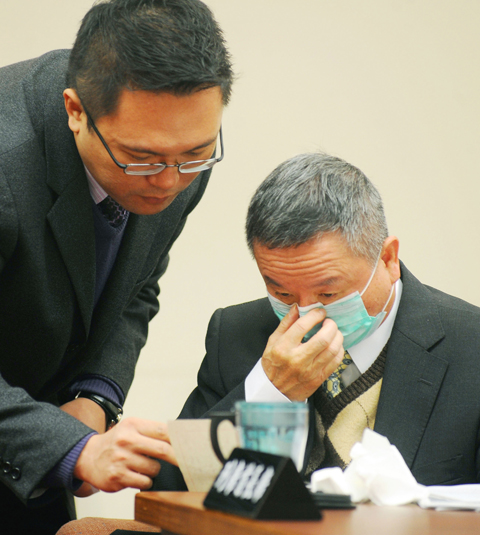Department of Health (DOH) officials faced pressure in the legislature yesterday after a sitting originally called to discuss an act governing the creation of a genome bank turned into a grilling over the department’s handling of doctors that were found to have colluded with patients to defraud NT$80 million (US$2.5 million) from the National Health Insurance system.
Chinese Nationalist Party (KMT) legislators Lin Hong-chi (林鴻池) and Ho Tsai-feng (侯彩鳳) said the DOH should step up its supervision of doctors practicing in public hospitals, adding that the standards of the medical profession were in decline.
“There have been many recent problems in the [profession] … [The DOH] needs to weed out the bad doctors,” Lin said. “The doctors that brought disgrace to the profession need to be severely punished and the DOH should step up its efforts to ensure that it does not happen again.”

PHOTO: WANG MIN-WEI, TAIPEI TIMES
He was referring to a case in which three doctors — Yang Chao-jan (楊超然), a physician at the DOH-run Keelung Hospital; Lai Teh-hsing (賴德興), a surgeon at Yee Zen General Hospital in Taoyuan County; and Wu Kuo-ching (吳國精), a surgeon at St. Joseph’s Hospital in Yunlin County — have been charged with fraud after allegedly colluding with patients to defraud insurance companies. The Taoyuan District Prosecutors Office also brought fraud charges against seven other individuals who allegedly acted as “patients.”
The doctors’ licenses to practice were revoked after evidence was seized by law-enforcement personnel and they confessed to colluding with a fraud ring since 2003 and falsifying treatment records and surgery reports to claim cancer payments from life insurance companies, the department said.
DOH officials defended the agency, saying they believed it had handled the matter promptly and properly.
Meanwhile, DOH Minister Yaung Chih-liang (楊志良) said the department would order the hospitals involved to suspend operations if they are found to have concealed information about illegal conduct by their doctors.
Four doctors practicing at other hospitals were also listed as suspects, Yaung said.

Eight restaurants in Taiwan yesterday secured a one-star rating from the Michelin Guide Taiwan for the first time, while three one-star restaurants from last year’s edition were promoted to two stars. Forty-three restaurants were awarded one star this year, including 34 in Taipei, five in Taichung and four in Kaohsiung. Hosu (好嶼), Chuan Ya (川雅), Sushi Kajin (鮨嘉仁), aMaze (心宴), La Vie by Thomas Buhner, Yuan Yi (元一) and Frassi in Taipei and Front House (方蒔) in Kaohsiung received a one-star rating for the first time. Hosu is known for innovative Taiwanese dishes, while Chuan Ya serves Sichuan cuisine and aMaze specializes

Taitung County is to launch charter flights to Malaysia at the end of this year, after setting up flights to Vietnam and Thailand, the Taitung County Government said yesterday. The new charter flight services, provided by low-cost carrier Batik Air Malaysia, would be part of five-day tour packages for visits to Taitung County or Malaysia. The Batik Air charter flight, with about 200 seats, would take Malaysian tourists to Taitung on Dec. 30 and then at 12:35pm return to Kuala Lumpur with Taiwanese tourists. Another charter flight would bring the Taiwanese home on Jan. 3 next year, arriving at 5:30pm, before taking the

Taiwan High Speed Rail Corp. (THSRC) plans to ease strained capacity during peak hours by introducing new fare rules restricting passengers traveling without reserved seats in 2026, company Chairman Shih Che (史哲) said Wednesday. THSRC needs to tackle its capacity issue because there have been several occasions where passengers holding tickets with reserved seats did not make it onto their train in stations packed with individuals traveling without a reserved seat, Shih told reporters in a joint interview in Taipei. Non-reserved seats allow travelers maximum flexibility, but it has led to issues relating to quality of service and safety concerns, especially during

An exhibition celebrating Taiwan and Japan’s comic culture opened on Saturday in Taichung, featuring a section that explores Taiwanese reproductions of Japanese comics from when martial law limited Japanese representation. “A Century of Manga Culture: An Encounter of Taiwan and Japan’s Youth” held its Taiwan opening ceremony at Taichung’s National Taiwan Museum of Comics after an initial one-month run in Japan’s Kyoto International Manga Museum between May 24 and June 24. Much like the Kyoto exhibition, the show mainly celebrates the comic connection between Taiwan and Japan through late Taiwanese comic book